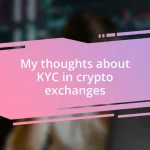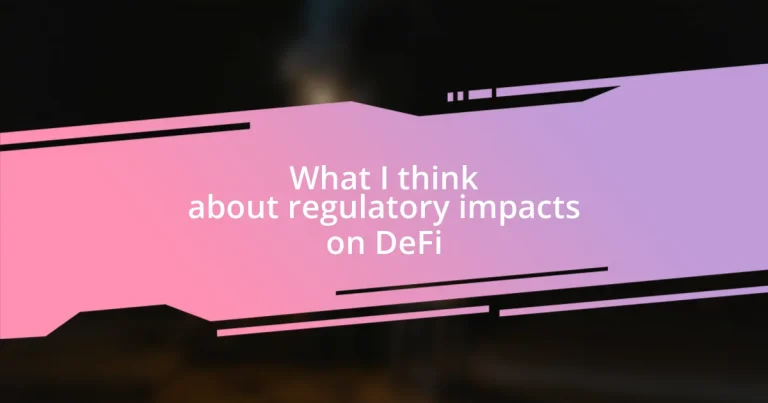Key takeaways:
- DeFi leverages blockchain technology and smart contracts to democratize finance, allowing direct peer-to-peer transactions without traditional banking intermediaries.
- Regulation is essential for fostering trust, consumer protection, and market stability in DeFi, potentially transforming skepticism into confidence among users.
- As regulations evolve, they can inspire innovative solutions and require transparency and proactive compliance strategies from DeFi projects to navigate challenges effectively.

Understanding DeFi Basics
Decentralized Finance, or DeFi, represents a groundbreaking shift in how we interact with financial services. I remember the first time I stumbled upon a DeFi platform; it felt like stepping into a new world where traditional banking limitations faded away. Isn’t it exciting to think that anyone with internet access can participate in financial activities without relying on conventional banks?
At its core, DeFi utilizes blockchain technology to create an open and inclusive financial system. This means that users can lend, borrow, and trade assets directly with one another, cutting out middlemen. I often think about how this democratization of finance can empower individuals, especially those in underserved communities who have historically lacked access to banking services.
Another fundamental aspect of DeFi is smart contracts; these self-executing contracts facilitate transactions automatically when specific conditions are met. The first time I tried using a smart contract for a lending protocol, I was amazed by the efficiency and transparency it offered. Isn’t it reassuring to consider that with DeFi, trust is placed in code rather than in institutions?
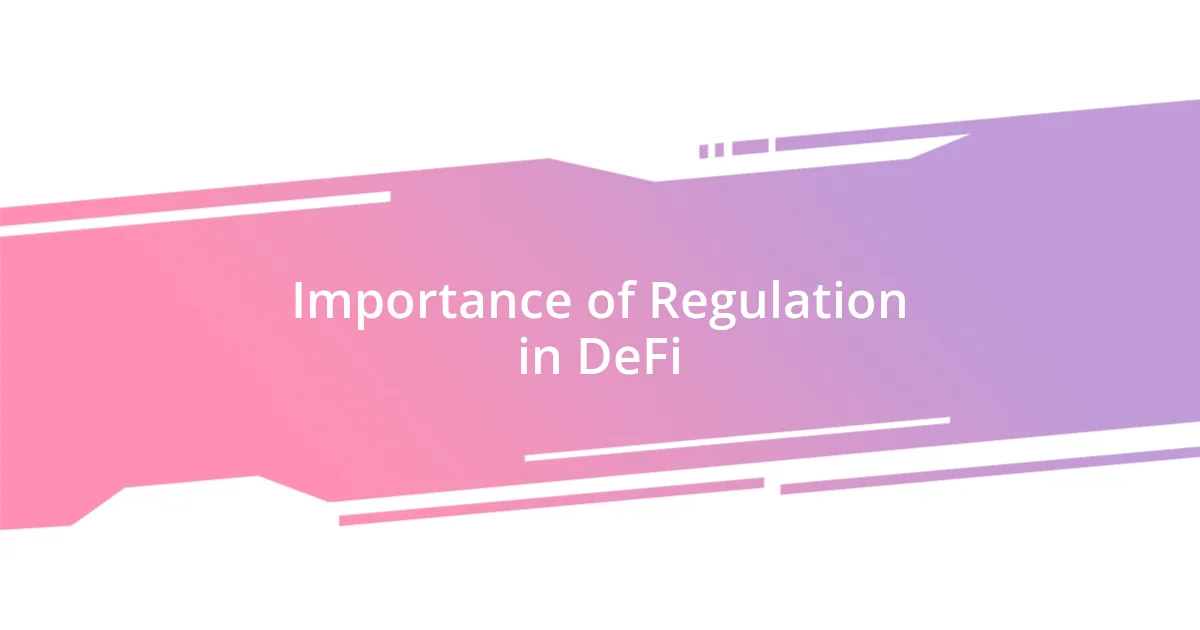
Importance of Regulation in DeFi
The role of regulation in DeFi is crucial, as it can provide a safety net for participants in this rapidly evolving landscape. I’ve often thought about how regulations could protect users from potential scams or vulnerabilities, which can sometimes lurk beneath the surface of innovative protocols. For instance, there was a time when I hesitated to invest in a DeFi project due to concerns about its legitimacy. Had there been clear regulatory guidelines, I might have felt more secure in my decisions.
Another aspect of regulation that truly resonates with me is its potential to foster trust in DeFi platforms. When people know that a system operates under certain legal frameworks, they may be more likely to engage with it. I remember discussing DeFi with a friend who was skeptical about its safety. With the right regulations, I believe we could transform that skepticism into confidence, encouraging broader adoption and innovation.
Furthermore, regulation can help stabilize the volatile nature of DeFi markets. As I’ve observed, the rapid price swings can intimidate newcomers, making them shy away from the space. Imagine if regulations could introduce standardized practices that promote more predictable market behavior—this could spark a wider interest in DeFi and bring in participants who otherwise wouldn’t consider it.
| Aspect | Unregulated DeFi | Regulated DeFi |
|---|---|---|
| User Trust | Lower trust due to fear of scams | Higher trust with established guidelines |
| Market Stability | Increased volatility | Potential for more predictable behavior |
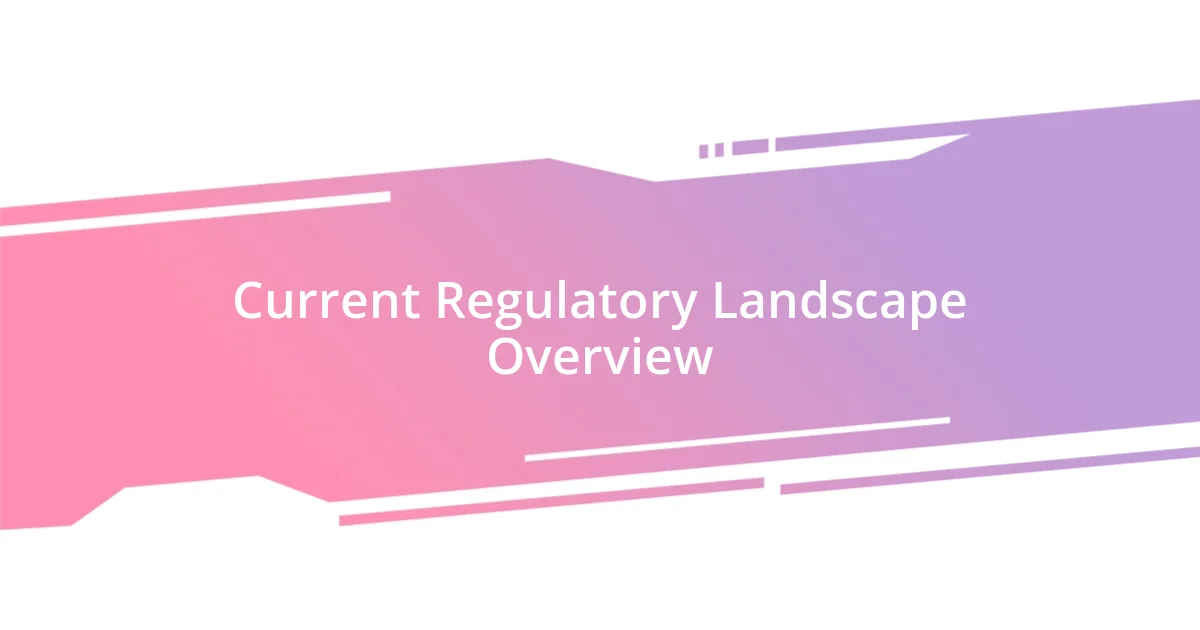
Current Regulatory Landscape Overview
I’ve been following how governments worldwide are grappling with the DeFi space, and it’s fascinating yet a bit nerve-wracking. Regulatory bodies are starting to establish frameworks to address the unique challenges posed by decentralized finance. This constant dance between innovation and regulation reminds me of a time when I navigated my first regulatory compliance process for a startup. The complexities and nuances can feel overwhelming but are ultimately essential for long-term sustainability.
Here are some key points shaping the current regulatory landscape for DeFi:
- Diverse Global Approaches: Different countries are approaching DeFi regulation with varying degrees of strictness—from outright bans to supportive frameworks.
- Definition of Securities: Many regulators are struggling to classify DeFi tokens and whether they qualify as securities, pushing for clearer definitions.
- Consumer Protection Focus: As a growing concern, many regulations are pivoting towards protecting consumers from fraud and ensuring transparency.
- Tax Implications: Tax regulations for DeFi transactions are still murky, leading to uncertainty among users about reporting requirements.
- Compliance Obligations: There’s an increasing push for DeFi projects to implement Know Your Customer (KYC) and Anti-Money Laundering (AML) practices.
I recall a discussion with a friend who is a legal expert, highlighting how evolving regulations could spark innovation rather than stifle it. The right frameworks could actually serve as a launchpad for projects aiming for compliance while still promoting unique offerings. It’s a thrilling time to be engaged in the DeFi space, but it also requires us to stay informed and adaptable as the regulatory landscape shifts.
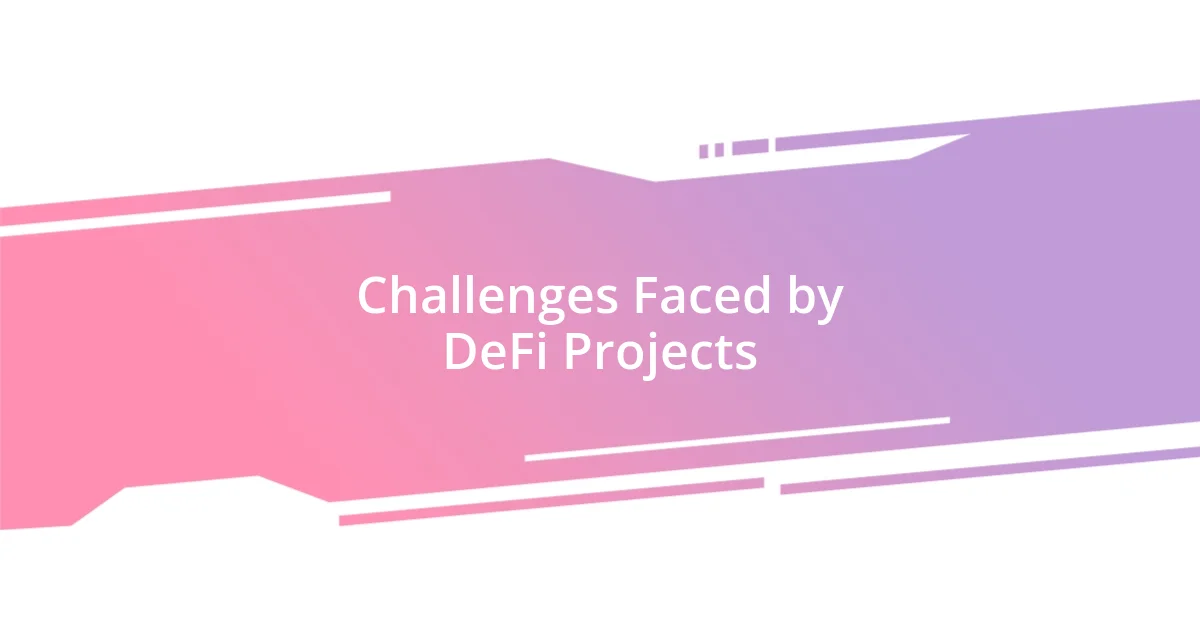
Challenges Faced by DeFi Projects
DeFi projects face a myriad of challenges, particularly in the realm of compliance. I remember the pressure I felt while consulting for a startup grappling with regulatory hurdles; it was clear that navigating these requirements took substantial time and resources. With so many rules to interpret, I often wondered how smaller teams could compete without the financial backing necessary to meet compliance standards.
Another significant issue is the evolving nature of regulation itself. I’ve seen firsthand how uncertain and often inconsistent laws can be; just when a project thinks it’s on stable ground, new guidelines emerge that can derail progress. This unpredictability can lead to hesitancy among potential investors, as they wonder if their investments are at risk due to the shifting legal landscape.
Additionally, many DeFi projects struggle with user education around regulatory implications. Reflecting on my own experience, I recall how my friends were initially overwhelmed by the complexities of DeFi investing. It became evident that a considerable amount of work is needed to clarify how regulations affect everyday users and their engagements. Ultimately, I believe improving education could empower users to embrace DeFi with confidence rather than fear.
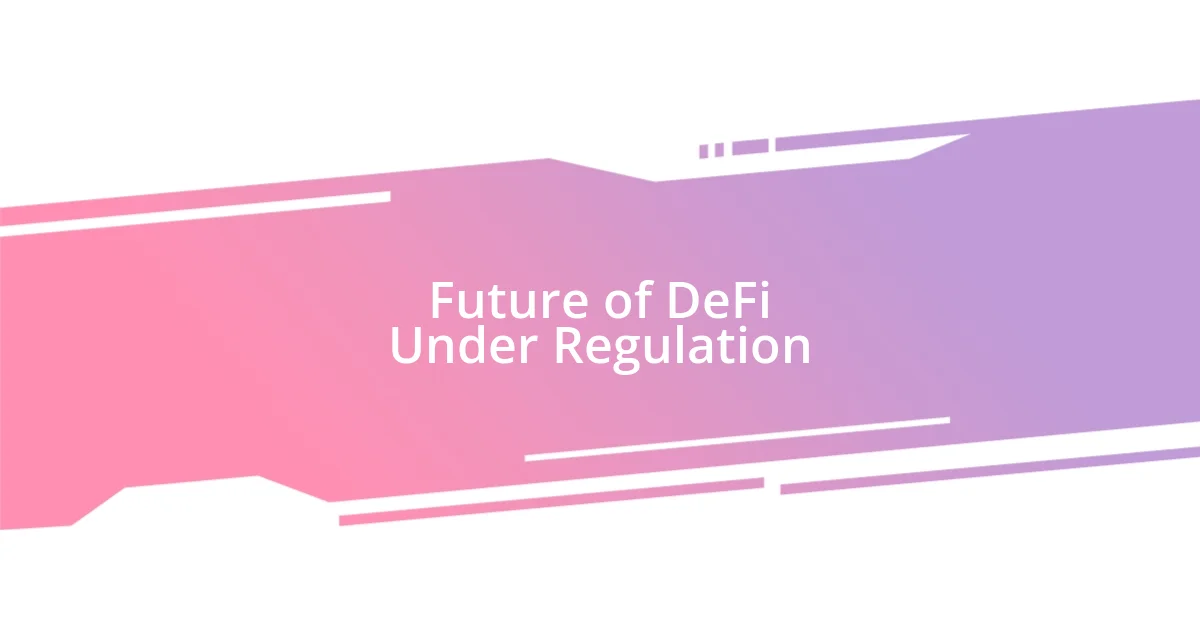
Future of DeFi Under Regulation
In envisioning the future of DeFi under regulation, I can’t help but feel a mix of optimism and caution. I recall a heated debate with colleagues about the potential for clarity in regulation to encourage institutional investment in DeFi projects. Wouldn’t it be a game-changer if clear guidelines made it easier for traditional finance to embrace decentralized solutions? I truly believe that the right kind of regulatory approach can act as a bridge, fostering collaboration rather than competition.
Looking ahead, I expect that as regulations evolve, so will the technology. The necessity for compliance could inspire innovative solutions, such as automated KYC systems seamlessly integrated into protocols. Personally, I’ve always found that challenges spark creativity; they push us to think outside the box. I wonder how many game-changing ideas are waiting in the wings, driven by regulatory demands?
However, navigating the regulatory environment will require more than just technological advancements; it will also demand transparency and communication. I remember joining an online forum to discuss upcoming regulations and was struck by how many voices were clamoring for clearer direction. How are projects expected to thrive if they can’t even predict their regulatory future? Engaging with users and being upfront about compliance efforts will be crucial for building trust. After all, aren’t we all striving for a space where innovation can flourish while protecting participants?
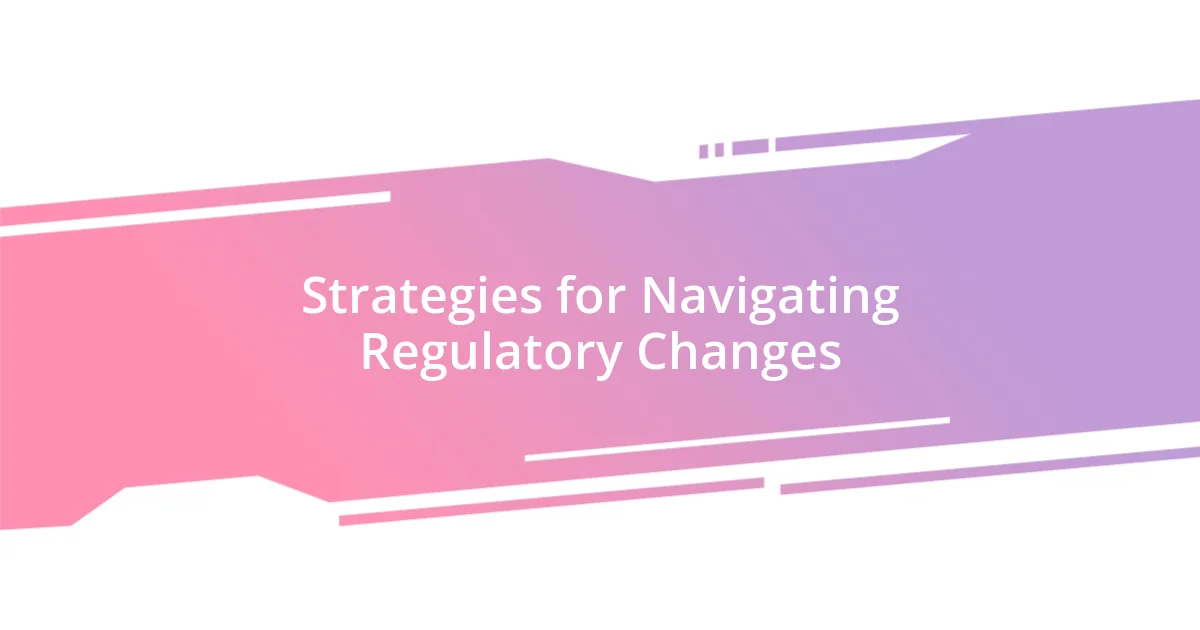
Strategies for Navigating Regulatory Changes
When it comes to navigating the shifting sands of regulatory changes, staying informed is key. I remember attending a regulatory conference where experts discussed upcoming changes. It opened my eyes to how valuable it is to actively engage with policy developments, not just stay passive. Have you ever found yourself blindsided by new regulations? I have, and it emphasized the importance of subscribing to newsletters and following relevant organizations to catch those critical updates early.
Another effective strategy is building a network of industry peers. During a recent chat with fellow DeFi enthusiasts, we shared our experiences in dealing with compliance. This exchange not only broadened my understanding but also highlighted the importance of collective knowledge. Isn’t it reassuring to know that you’re not navigating these changes alone? Connecting with others can foster collaboration and quickly provide you with the insights necessary to adapt your strategy.
Lastly, I firmly believe that adopting a proactive stance towards compliance can pay off in the long run. I once advised a DeFi startup to develop robust internal policies well before regulations were established. They did, and when those regulations finally dropped, they were miles ahead of competitors who were scrambling to catch up. Why wait for changes to affect you negatively when you can prepare ahead of time? This approach not only positions companies for success but also instills confidence among users, showing that they value security and transparency in an often uncertain landscape.







